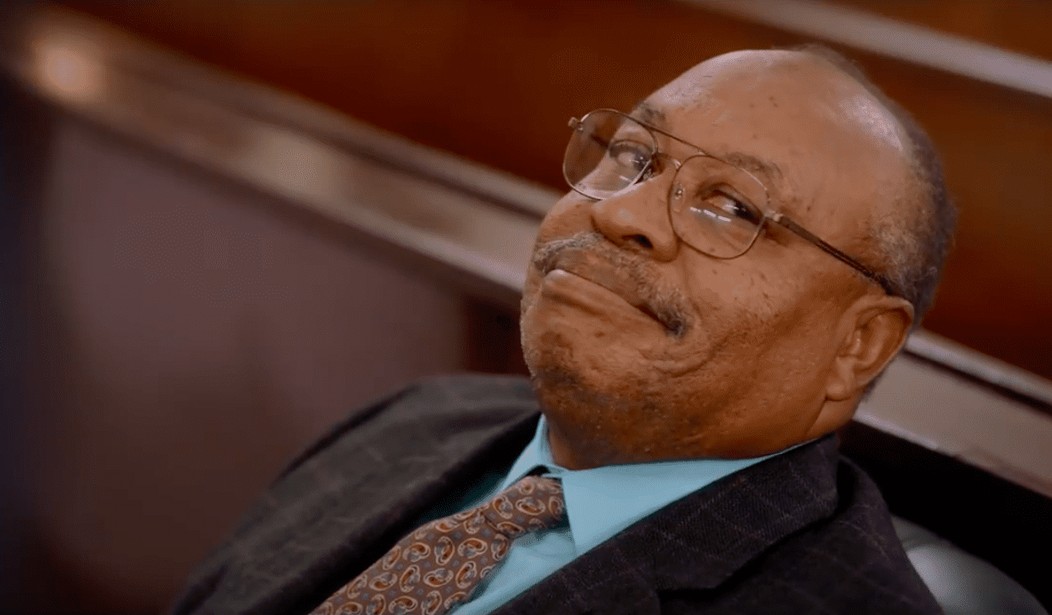The new movie “Gosnell: The Trial of America’s Greatest Serial Killer” isn’t a pro-life activist project, but rather a compelling, heartbreaking movie about horrific crimes perpetrated in the name of furthering a woman’s “right to choose.” The convicted murderer Kermit Gosnell (Earl Billings) matter-of-factly voices a pro-abortion mantra to justify his crimes, a mantra that rings utterly hollow as the horrors of his abortion clinic become exposed. [Warning: Spoilers.]
“I provide the standard of care for them that I would want for my own daughter,” Gosnell repeats on television and in court testimony. The abortionist seems sincere in this statement, and that is all the more horrifying.
The movie is based on the story masterfully told by Ann McElhinney and Phelim McAleer in their bestselling book, “Gosnell: The Untold Story of America’s Most Prolific Serial Killer.” The crime drama tells the true story of Gosnell, who was sentenced to life in prison in 2013 for the murder of three babies born alive. His abortion practice also led to the death of Karnamaya Mongar, a recent immigrant who was turned away from other clinics because an abortion would be too dangerous.
In a panel at the Values Voter Summit, actor Dean Cain explained that he is personally pro-choice, and many characters in the film — notably Assistant District Attorney (ADA) Alexis McGuire (Sarah Jane Morris) — are also pro-choice. Even so, the movie powerfully exposes the falsehood of many popular abortion defenses.
1. Abortion justifies unsafe conditions.
In recent years, pro-life state legislators have passed bills requiring certain safety standards for abortion clinics. Abortion activist groups like Planned Parenthood object, claiming the legislators merely intend to force abortion clinics to close down. While Planned Parenthood may not say it directly, the activists believe abortion is so important that it justifies abortion clinics failing to meet high medical standards, such as those required for admitting privileges at local hospitals.
In the movie, Gosnell echoes exactly this kind of argument, and it is utterly disgusting. A DEA team breaks into Gosnell’s abortion clinic early in the film, finding aborted baby parts (feet preserved in jars), stray cats, many animals, rotting food, papers everywhere, and animal feces.
Former staff testified that Gosnell trained them “for about 20 minutes” and urged them to administer anesthesia themselves. When asked about these illegal activities the abortionist urged his “unlicensed and untrained staff” to perform, the abortionist declared his lack of respect for medical laws.
“These laws. … The enemies of abortion erected them to create barriers between women and my services,” the abortionist declares. “I have no respect for these laws whatsoever. These poor women who need me have nowhere else to go.” Sound familiar?
Very few abortion clinics are as deplorable as Gosnell’s “house of horrors.” Even so, laws to maintain high medical standards should be encouraged, not dismissed as a threat to the existence of abortion clinics.
Another telling moment involves Gosnell’s lawyer Mike Cohan (Nick Searcy) dismissing the death of Karnamaya Mongar as a baseless attack from a Roman Catholic police department.
“They come up with one tragic death, one death in 31 years, and they think that tragic case makes him a monster,” Cohan says. “This man’s clinic has been in operation for years, year after year after year.” Gosnell’s patients are so satisfied that “some of them even come back for a third or fourth procedure. Why would they come back if this man was a monster?”
The lawyer attributes the criminal case to malice, not to any concern for women’s safety. He condemns “an overly zealous Catholic investigator in a police department dominated by Catholicism,” suggesting the case is “a targeted racist prosecutorial lynching.”
Abortion activists fight hard to keep their power, and they even see laws to protect women as stealth attempts to outlaw abortion. When a woman dies in an abortion clinic, people should look the other way, rather than demand medical standards.
As an aside, the department of public health and safety did not investigate Gosnell’s clinic for political reasons. That shows just how much power the abortion lobby can have.
2. Abortion is empowering for black women.
In the movie, District Attorney Dan Molinari (Michael Beach) warns ADA Alexis McGuire that if she prosecutes Gosnell, she will be seen as a racist — because the abortionist is black. But the true racial history of abortion is ugly not because abortionists have been black, but because so many of their patients are and have been black.
“Cohan’s got the jury thinking that Gosnell’s just an ordinary abortion doctor who cut corners to bring services to poor black women,” Molinari, himself a black man, explains.
Indeed, earlier this year, pro-abortion billboards went up in black neighborhoods, and one billboard campaign actively promoted abortion for black women. “Black women take care of their families by taking care of themselves,” the billboard said. “Abortion is self-care.”
What is the result of this “self-care,” however? The death of black babies. In fact, the eugenics movement pushed abortion and forced sterilization for the “unfit,” often defined in racial terms.
Obianuju Ekeocha, founder and president of Culture of Life Africa, decried “the boldness of abortion-racism.” She tweeted, “Black communities are being targeted by the abortion industry with black women 3times more likely to abort their babies than white women. Yet, here is a billboard campaign to glamorize the killing of black babies. Dear sisters,wake up & walk away.”
The boldness of abortion-racism.
Black communities are being targeted by the abortion industry with black women 3times more likely to abort their babies than white women.Yet,here is a billboard campaign to glamorize the killing of black babies.
Dear sisters,wake up & walk away. https://t.co/8O1uGDmQcN— Obianuju Ekeocha (@obianuju) August 29, 2018
Lila Rose, founder of the pro-life organization LiveAction, added, “The abortion lobby’s war against Blacks is real. Blacks make up 13% of the population, but endure 35% of abortions. In NYC, a Black baby is more likely to be aborted than to be born.”
This is a billboard in Dallas, TX, trying to convince Black women to exterminate themselves.
The abortion lobby's war against Blacks is real.
Blacks make up 13% of the population, but endure 35% of abortions.
In NYC, a Black baby is more likely to be aborted than to be born. pic.twitter.com/iAx9eeN9Co
— Lila Rose (@LilaGraceRose) August 30, 2018
Alveda King, niece of Civil Rights icon Martin Luther King, Jr., has denounced abortion as a “black genocide.”
Furthermore, abortion has long-term health and psychological effects on women.
Not only did Gosnell seem to specifically target black women, he also treated them worse than white women in his clinic!
“When a white woman would come, she would get the room upstairs,” one of his untrained nurses testifies in the court. “It was cleaner and more quiet.”
Unbelievable.
3. The inhumanity of unwanted children.
Kermit Gosnell maintained a disgusting clinic that proved a death trap for thousands of unborn babies and Karnamaya Mongar, but the crime that landed him in prison was the murder of three already born babies.
The most moving testimony in the entire film comes from Gosnell’s own adopted daughter. Adrienne Moton hesitates to speak with ADA McGuire and Detective James Wood (Dean Cain), but eventually she decides to do so. “This is the baby I saw moving,” Moton says, showing them a photo of a baby who was killed in Gosnell’s clinic.
The baby would become known as “Baby Boy A,” and he was one of the babies Gosnell was convicted of murdering.
When the jury sees the picture Moton shares, members burst into tears.
ADA McGuire asks Moton, “Why did you take a photograph of this particular baby?”
The girl’s answer should bring tears to everyone’s eyes. “He was so big, he looked like he could be somebody’s brother. I just thought that there should be a photo of him, to show that he was here for a little while,” Moton says.
“I just thought there should be a photo of him, to show that he was here for a little while.”
Human dignity cannot be expunged by the fact that a tiny defenseless baby is unwanted. Gosnell failed to kill Baby Boy A in the womb, so the baby survived after birth, just long enough for Moton to snap a photograph. His human dignity was preserved because she just couldn’t stand to think of a world that would forget him, without a trace.
“I just thought there should be a photo of him, to show that he was here for a little while.” If that tragic statement doesn’t reveal the horror of abortion, what can? What human being has a heart so callous that he or she cannot grieve on hearing that millions of unborn babies have their lives snuffed out, and that at least three born babies died at the hands of this horrific abortionist.
If the fact that a baby is unwanted does not destroy that baby’s dignity, why does the baby’s position in the womb make him or her any less human? Genetics has revealed that each human being is unique from the moment of conception — that, rather than some weird religious belief, is the true basis of the pro-life conviction. That, and the belief that all human beings have inherent dignity and deserve to be protected, to have a chance, or at the very least, to be remembered.
“I just thought that there should be a photo of him, to show that he was here for a little while,” Adrienne Moton says.
The ancient Greeks and Romans did not believe this. They exposed their unwanted babies to die. The early Christians saved these babies, because of the conviction that these little humans possessed inherent dignity. The Western legal tradition and the best of America’s soul are descended from that fundamental conviction.
Kermit Gosnell received life in prison because he took the lives of unwanted babies. Baby Boy A was just as human as the rest of us, and Gosnell snipped his spine with scissors — after he was born.
Abortion activists do not defend Kermit Gosnell, but their movement enabled this horrific monster to not just perpetrate his evil, but justify himself in doing so. He honestly thought he was helping women, and Americans need to ask themselves why.
If pro-life activists are held accountable for the violence committed against abortionists, abortion activists must answer for their culture of death that enabled a man like Kermit Gosnell to justify himself.
Abortion activists don’t agree with Kermit Gosnell, but they do agree that a human being’s dignity is to some degree defined by whether or not his or her mother wants him or her to live outside the womb. To this fundamental defense of abortion, pro-lifers can only respond, “I just thought there should be a photo of him, to show that he was here for a little while.”
Every ultrasound is a shattering blow to the heart of abortion. Adrienne Moton’s small act of defiance in taking a photo of a human being Gosnell did not consider human helped bring down this horrific abortionist.
Follow the author of this article on Twitter at @Tyler2ONeil.









Join the conversation as a VIP Member